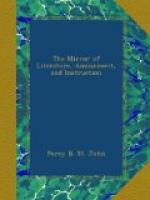The transports are taken from Newgate in parties of twenty-five, which is called a draft. When the turnkeys lock up the wards of the prison at the close of the day, they call over the names of the convicts under orders for removal, at the same time informing them at what hour of the night or morning they will be called for, and to what place and ship they are destined. This notice, which frequently is not more than three or four hours, is all that is given them; a regulation rendered necessary to obviate the bustle and confusion heretofore experienced, by their friends and relatives thronging the gates of the prison, accompanied by valedictory exclamations at the departure of the van in which they are conveyed. Before this order arrives, most of them have endured many months’ confinement, and having exhausted the liberality, or funds—perhaps both—of their friends, have been constrained to subsist on the goal allowance. This, together with the sameness of a prison life, brings on a weariness of mind, which renders any change agreeable to their now broken spirits; the prospect of a removal occasions a temporary excitement, which, to those unaccustomed to reason on the matter, may appear like gaiety, and carelessness of the future. The noise and apparent recklessness, however, on these occasions, are produced more by those prisoners who are to remain behind, availing themselves of the opportunity to beguile a few hours of tedious existence by a noisy and forced merriment, which they know the officers on duty will impute to the men under orders for the ship. This is confirmed by the inmates of the place being, on all other nights of the year, peaceable after they have been locked up in their respective wards. Those who suppose there is any real mirth or indifference among them at any time, have taken but a superficial view of these wretched men. Heaviness and sickness of heart are always with them; they will at times make an effort to feel at ease, but all their hilarity is fictitious and assumed—they have the common feelings of our nature, and of which they can never divest themselves. Those who possess an unusual buoyancy of spirits, and gloss over their feelings with their companions, I have ever observed on the whole, to feel the most internal agony. I have seen upwards of two thousand under this sentence, and never conversed with one who did not appear to




